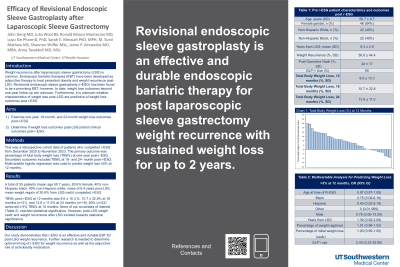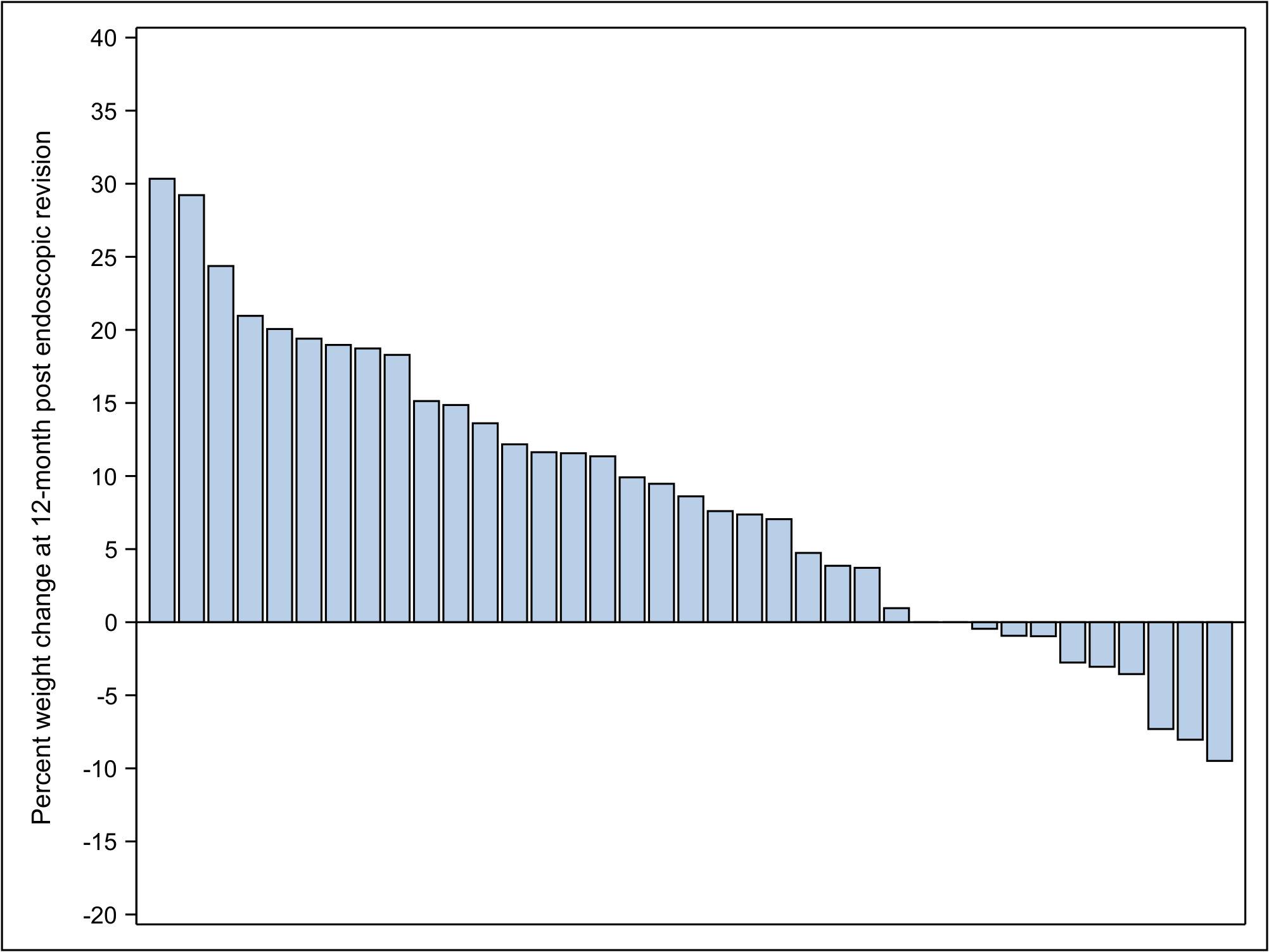Monday Poster Session
Category: Interventional Endoscopy
P2780 - Efficacy of Revisional Endoscopic Sleeve Gastroplasty After Laparoscopic Sleeve Gastrectomy
Monday, October 28, 2024
10:30 AM - 4:00 PM ET
Location: Exhibit Hall E

Has Audio
- JD
John Deng, MD
University of Texas Southwestern Medical Center
Dallas, TX
Presenting Author(s)
John Deng, MD1, Julia Wool, BS2, Ronald Blanco Montecino, MD2, Luyu Xie, PharmD, PhD3, Sarah Messiah, PhD, MPH3, M. Sunil Matthew, MS3, Shannon Shiffer, MSc1, Jaime Almandoz, MD, MBA, MRCPI, FTOS1, Anna Tavakkoli, MD, MSc1
1University of Texas Southwestern Medical Center, Dallas, TX; 2University of Texas Southwestern, Dallas, TX; 3University of Texas Health Science Center, Dallas, TX
Introduction: Weight recurrence after laparoscopic sleeve gastrectomy (LSG) is common. Endoscopic bariatric therapies (EBT) have been developed as adjunctive therapy to treat persistent obesity and weight recurrence post-LSG. Revisional endoscopic sleeve gastroplasty (r-ESG) has been found to be a promising EBT; however, to date, weight loss outcomes beyond one-year follow-up are unknown. Further, it is unknown whether characteristics of weight loss post-LSG are predictive of weight loss outcomes post r-ESG. Our study aims to: 1) Examine one year, 18-month, and 24-month weight loss outcomes post-r-ESG; 2) Determine if weight loss outcomes post-LSG predict clinical outcomes post-r-ESG.
Methods: This was a retrospective cohort data of patients who completed r-ESG from December 2020 to November 2023. The primary outcome was percentage of total body weight loss (TBWL) at one-year post-r-ESG. Secondary outcomes included TBWL at 18- and 24- month post-r-ESG. Multivariable logistic regression was used to predict weight loss ≥5% at 12 months. Covariates of interest included patient age, sex, race/ethnicity, time since LSG, post-LSG nadir (%), weight recurrence post-LSG (%), and use of GLP-1 receptor agonists.
Results: A total of 55 patients (mean age 50.7 years, 83.6% female, 40% non-Hispanic black, 40% non-Hispanic white, mean of 8.4 years post-LSG, mean weight regain of 30.6% from LSG nadir) completed r-ESG.
TBWL post-r-ESG at 12-months was 8.6% (n=37), at 18-months was 10.7% (n=31), and at 24 months was 12.6% (n=18) [Figure 1]. After controlling for covariates of interest, no statistically significant variables were associated with weight loss ≥5% at 12 months [Table 1]. However, post-LSG nadir % (OR 0.99, 95% CI 0.95-1.05) and weight recurrence after LSG (OR 1.01, 95% CI 0.98-1.03) trended towards statistical significance.
Discussion: Our study demonstrates that r-ESG is an effective and durable EBT for post-LSG weight recurrence. Further research is needed to determine optimal timing of r-ESG for weight recurrence as well as the adjunctive role of anti-obesity medication.

Note: The table for this abstract can be viewed in the ePoster Gallery section of the ACG 2024 ePoster Site or in The American Journal of Gastroenterology's abstract supplement issue, both of which will be available starting October 27, 2024.
Disclosures:
John Deng, MD1, Julia Wool, BS2, Ronald Blanco Montecino, MD2, Luyu Xie, PharmD, PhD3, Sarah Messiah, PhD, MPH3, M. Sunil Matthew, MS3, Shannon Shiffer, MSc1, Jaime Almandoz, MD, MBA, MRCPI, FTOS1, Anna Tavakkoli, MD, MSc1. P2780 - Efficacy of Revisional Endoscopic Sleeve Gastroplasty After Laparoscopic Sleeve Gastrectomy, ACG 2024 Annual Scientific Meeting Abstracts. Philadelphia, PA: American College of Gastroenterology.
1University of Texas Southwestern Medical Center, Dallas, TX; 2University of Texas Southwestern, Dallas, TX; 3University of Texas Health Science Center, Dallas, TX
Introduction: Weight recurrence after laparoscopic sleeve gastrectomy (LSG) is common. Endoscopic bariatric therapies (EBT) have been developed as adjunctive therapy to treat persistent obesity and weight recurrence post-LSG. Revisional endoscopic sleeve gastroplasty (r-ESG) has been found to be a promising EBT; however, to date, weight loss outcomes beyond one-year follow-up are unknown. Further, it is unknown whether characteristics of weight loss post-LSG are predictive of weight loss outcomes post r-ESG. Our study aims to: 1) Examine one year, 18-month, and 24-month weight loss outcomes post-r-ESG; 2) Determine if weight loss outcomes post-LSG predict clinical outcomes post-r-ESG.
Methods: This was a retrospective cohort data of patients who completed r-ESG from December 2020 to November 2023. The primary outcome was percentage of total body weight loss (TBWL) at one-year post-r-ESG. Secondary outcomes included TBWL at 18- and 24- month post-r-ESG. Multivariable logistic regression was used to predict weight loss ≥5% at 12 months. Covariates of interest included patient age, sex, race/ethnicity, time since LSG, post-LSG nadir (%), weight recurrence post-LSG (%), and use of GLP-1 receptor agonists.
Results: A total of 55 patients (mean age 50.7 years, 83.6% female, 40% non-Hispanic black, 40% non-Hispanic white, mean of 8.4 years post-LSG, mean weight regain of 30.6% from LSG nadir) completed r-ESG.
TBWL post-r-ESG at 12-months was 8.6% (n=37), at 18-months was 10.7% (n=31), and at 24 months was 12.6% (n=18) [Figure 1]. After controlling for covariates of interest, no statistically significant variables were associated with weight loss ≥5% at 12 months [Table 1]. However, post-LSG nadir % (OR 0.99, 95% CI 0.95-1.05) and weight recurrence after LSG (OR 1.01, 95% CI 0.98-1.03) trended towards statistical significance.
Discussion: Our study demonstrates that r-ESG is an effective and durable EBT for post-LSG weight recurrence. Further research is needed to determine optimal timing of r-ESG for weight recurrence as well as the adjunctive role of anti-obesity medication.

Figure: Figure 1: Total Body Weight Loss (%) at 12 Months
Note: The table for this abstract can be viewed in the ePoster Gallery section of the ACG 2024 ePoster Site or in The American Journal of Gastroenterology's abstract supplement issue, both of which will be available starting October 27, 2024.
Disclosures:
John Deng indicated no relevant financial relationships.
Julia Wool indicated no relevant financial relationships.
Ronald Blanco Montecino indicated no relevant financial relationships.
Luyu Xie indicated no relevant financial relationships.
Sarah Messiah indicated no relevant financial relationships.
M. Sunil Matthew indicated no relevant financial relationships.
Shannon Shiffer indicated no relevant financial relationships.
Jaime Almandoz: Eli Lilly and Company – Consultant. Novo Nordisk – Consultant.
Anna Tavakkoli indicated no relevant financial relationships.
John Deng, MD1, Julia Wool, BS2, Ronald Blanco Montecino, MD2, Luyu Xie, PharmD, PhD3, Sarah Messiah, PhD, MPH3, M. Sunil Matthew, MS3, Shannon Shiffer, MSc1, Jaime Almandoz, MD, MBA, MRCPI, FTOS1, Anna Tavakkoli, MD, MSc1. P2780 - Efficacy of Revisional Endoscopic Sleeve Gastroplasty After Laparoscopic Sleeve Gastrectomy, ACG 2024 Annual Scientific Meeting Abstracts. Philadelphia, PA: American College of Gastroenterology.
